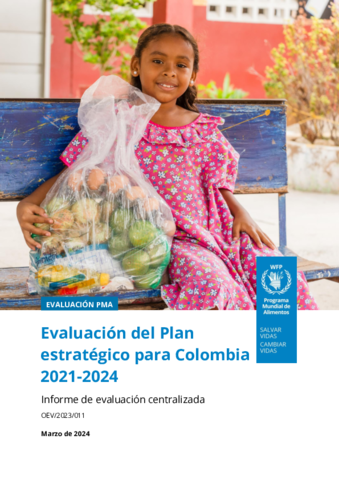
The evaluation concluded that the country strategic plan has been relevant to the needs and conditions in Colombia and was adapted to the characteristics of a high-middle-income country with strong institutions and the capacity to manage significant humanitarian crises. WFP has built on its comparative advantages to support and complement the Colombian Government’s response to four types of crises with very different characteristics: the coronavirus disease 2019 pandemic, migratory flows, violence and natural disasters.
In response to an increase in humanitarian needs, WFP had to absorb unprecedented growth in the resources and operational capacity available to it. The country office successfully achieved the massive expansion required to grow from a small office into one of the largest WFP offices in the world, although this transformation posed challenges for the efficiency of internal processes and the systematization of lessons learned.
The country strategic plan contributed to results in sectors that can be considered non-traditional for WFP, such as social cohesion and socioeconomic integration within the framework of national efforts to foster integrated local development and contributions to peace. WFP has achieved relevant results in those areas and is gathering significant learning from its experience.
WFP helped to strengthen the capacities of national institutions, but a more systematic approach to capacity strengthening, with clear transition strategies to national ownership of interventions, could have enhanced the effectiveness and sustainability of its results. Notably, when WFP is acting as a government contractor in the implementation of interventions there is a high risk that it ends up substituting government capacity, resulting in very limited prospects for the sustainability of results if no exit strategies are envisaged.
The country strategic plan allowed WFP to expand its range of partners and thematic focus and to attract resources. However, the relative fragmentation of the donor base for development programming, donors’ preferences in terms of targeting and geographical prioritization and the prevalence of short-term funding windows led to a multiplicity of short-term projects with challenges for maintaining strategic and operational coherence, particularly in resilience building interventions.
Under the country strategic plan, gender considerations were systematically integrated into programming. While some positive contributions were identified in terms of women’s empowerment, approaches aimed at promoting women’s participation in WFP interventions have predominated, and more could be done to influence the transformation of the structural problems that affect the ability of women to realize their potential in society. Consideration of ethnicity was also an important element of programming and efforts were made to ensure the inclusion of different ethnic groups in the design of WFP interventions.
The country office’s monitoring systems proved to be of limited utility for strategic programme management and for capturing results at the outcome level over the long term, particularly in areas such as social cohesion, socioeconomic integration and capacity strengthening.
The evaluation made six recommendations, the overarching thrust of which was to recommend a move towards consolidating interventions through the evidence-based prioritization of sectors and geographical areas; the strengthening of links between humanitarian, development and peacebuilding interventions; and a focus on increasing operational efficiency in the face of reduced funding.



